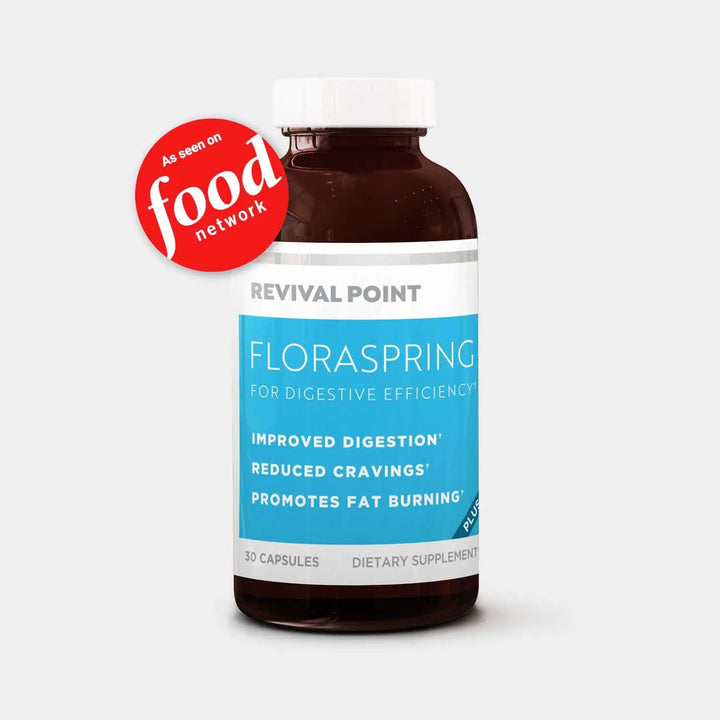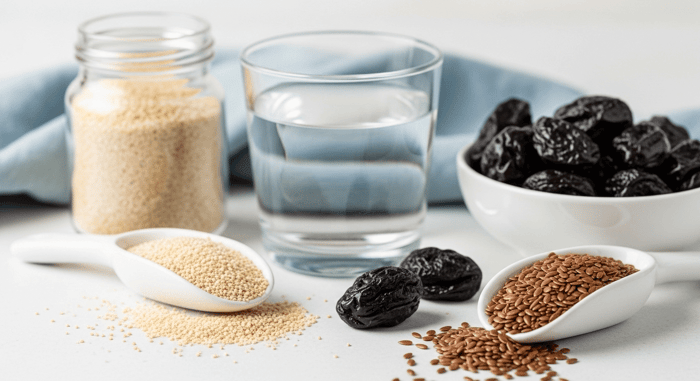Table of Contents
- Understanding Bowel Movements
- Dietary Choices for Optimal Bowel Movements
- Lifestyle and Behavioral Interventions
- Medical Approaches to Bowel Evacuation
- Understanding and Managing Conditions Affecting Bowel Movements
- Natural and Home Remedies
- The Risks and Warnings
- The Supplement That Can Gently Empty Your Bowels Daily
Feeling stuck in the bathroom? Many people struggle to fully empty their bowels. This can lead to discomfort and health issues.
The good news is there are simple ways to improve your digestive system and have more complete bowel movements.
Drinking plenty of water, eating fiber-rich foods, and exercising regularly can help your colon function better, as can certain supplements.
These habits encourage waste to move through your digestive tract more easily. Some people also find success with bowel retraining techniques.
Paying attention to your body's signals and giving yourself enough time on the toilet are important too. Relaxation and proper posture while on the toilet can make a big difference.
With some small changes, most people can achieve more satisfying and complete bowel movements.
Understanding Bowel Movements
Bowel movements are a key part of digestive health. They help remove waste from the body and keep the gut working well. Knowing what's normal can help spot issues early.
The Role of the Colon in Digestion
The colon is the last stop in digestion. It absorbs water from waste and forms stool. The colon moves stool along with muscle contractions. This process usually takes 24 to 72 hours.
Bacteria in the colon break down leftover food. They make vitamins and help keep the gut healthy. A healthy colon has a good mix of bacteria.
The colon also helps balance fluids in the body. It takes in water when the body needs it. It adds water to stool when needed to keep it soft.
What Constitutes a Healthy Bowel Movement
A healthy bowel movement is:
- Easy to pass
- Soft but formed
- Brown in color
- Happens 3 times a day to 3 times a week
The Bristol Stool Chart helps describe stool:
| Type | Description |
|---|---|
| 1-2 | Hard, lumpy (constipation) |
| 3-4 | Ideal consistency |
| 5-7 | Loose, watery (diarrhea) |
Healthy stools shouldn't smell too bad or float. They should sink slowly. Wiping should be easy and clean.
Common Issues: From Constipation to Diarrhea
Constipation means hard, dry stools that are tough to pass. It can cause:
- Bloating
- Stomach pain
- Incomplete bowel movements
Diarrhea is loose, watery stools more than 3 times a day. It can lead to:
- Dehydration
- Nutrient loss
- Sore bottom
Both issues can stem from diet, stress, or health problems. Drinking water and eating fiber can help with both. Seeing a doctor is smart if problems last more than a few days.
Dietary Choices for Optimal Bowel Movements
Eating the right foods and staying hydrated are key for healthy digestion.
Certain dietary choices can help promote regular bowel movements and keep your digestive system running smoothly.
Importance of Fiber in Your Diet
Fiber is crucial for digestive health. It adds bulk to stool and helps food move through the intestines. There are two main types of fiber:
- Soluble fiber: Dissolves in water and forms a gel-like substance
- Insoluble fiber: Doesn't dissolve and adds bulk to stool
Adults should aim for 25-30 grams of fiber daily. Whole grains, fruits, vegetables, beans, and lentils are excellent sources of fiber.
Some high-fiber foods to include:
- Wheat bran
- Oats
- Apples
- Pears
- Prunes
- Kiwifruit
Gradually increase fiber intake to avoid gas or bloating. Drink plenty of water when eating more fiber.
Probiotics and Gut Health
Probiotics are beneficial bacteria that support digestive health. They help maintain a balanced gut microbiome and can improve bowel regularity.
Good sources of probiotics include:
- Yogurt
- Kefir
- Sauerkraut
- Kimchi
- Kombucha
Eating a variety of fermented foods provides different strains of beneficial bacteria. Probiotic supplements are also available but should be taken under medical guidance.
Regular consumption of probiotics may help relieve constipation and promote more frequent bowel movements.
Floraspring® Probiotics (25 Billion CFU's)

$177.00
$209.85
Floraspring® is a probiotic specifically designed with 15 science-backed probiotic strains INCLUDING 5 SUPER STRAINS for a complex balance support for weight, management, digestive health, and suppression of cravings.* 25 Billion Powerful Colony-Forming Units (CFUs) 15 Scientifically Backed Probiotic Strains… read more
Hydration Essentials
Proper hydration is vital for healthy bowel function. Water helps soften stool and move waste through the intestines.
Aim to drink 8-10 cups of fluid daily. Water is the best choice, but other good options include:
- Herbal tea
- Clear broths
- Fresh fruit juices (in moderation)
Limit caffeine and alcohol, as they can be dehydrating. Some people find warm liquids, especially in the morning, help stimulate bowel movements.
Recommended Foods for Digestive Health
Certain foods are particularly beneficial for promoting regular bowel movements:
Fruits: Apples, pears, and grapes contain high levels of water and fiber.
Vegetables: Leafy greens, broccoli, and Brussels sprouts are rich in fiber and nutrients.
Legumes: Beans, lentils, and peas are excellent sources of fiber and protein.
Whole grains: Oats, quinoa, and brown rice provide complex carbohydrates and fiber.
Prunes: These dried fruits are a natural laxative due to their fiber and sorbitol content.
Including a variety of these foods in your diet can help maintain regular bowel movements and support overall digestive health.
Lifestyle and Behavioral Interventions
Making changes to daily habits can help improve bowel movements. Simple adjustments to exercise, stress levels, and bathroom routines often lead to better results.
The Impact of Regular Exercise
Exercise plays a key role in bowel health. Moving the body helps stimulate the intestines. This speeds up the passage of stool through the colon.
Aim for at least 30 minutes of moderate activity most days. Walking, swimming, or cycling are good options. Even short bursts of movement can help. Try taking a quick walk after meals.
Regular exercise also helps reduce stress. This can ease tension in the abdominal muscles. Relaxed muscles make it easier to have a bowel movement.
Stress Management Techniques
Stress can disrupt normal bowel function. Learning to manage stress may improve bathroom habits.
Try deep breathing exercises. Take slow, deep breaths for a few minutes each day. This can help calm the body and mind.
Visualization techniques may also help. Picture a relaxed, smooth bowel movement. This can ease tension and promote regularity.
Other useful methods include:
- Meditation
- Yoga
- Progressive muscle relaxation
Find what works best for you. Regular practice is key for seeing results.
Bowel Retraining Programs
Bowel retraining teaches new skills to improve bowel control. These programs can help with incomplete emptying or constipation.
A key part is setting a regular bathroom schedule. Try to go at the same time each day. This helps train the body to have more predictable movements.
Use the gastrocolic reflex to your advantage. This reflex causes the colon to contract after eating. Plan bathroom visits 20-30 minutes after meals.
Proper sitting position is important. Use a footstool to raise your knees above your hips. This creates a better angle for emptying the bowels.
Biofeedback may be part of some programs. It helps you learn to relax pelvic floor muscles during bowel movements.
Medical Approaches to Bowel Evacuation
Doctors use various methods to help patients fully empty their bowels. These range from simple over-the-counter remedies to more complex medical procedures. The right approach depends on the cause and severity of the issue.
Over-the-Counter Solutions
Many people find relief with over-the-counter laxatives. These products work in different ways to ease bowel movements.
Osmotic laxatives like Miralax draw water into the intestines. This softens stool and makes it easier to pass. Stimulant laxatives cause the intestines to contract, pushing stool out.
Stool softeners and fiber supplements can also help. They make stools softer and bulkier, which helps them move through the digestive system.
It's important to use these products as directed. Overuse can lead to dependence or other health issues.
Thankfully, there are supplements that don't require you to take in spoonfuls of fiber or run to the toilet all the time, like this one we formulated with an Ivy League Doctor:
Prescription Medications and Treatments
When over-the-counter options don't work, doctors may prescribe stronger medications. These can include prescription-strength laxatives or drugs that increase fluid in the intestines.
For some patients, biofeedback therapy might help. This teaches people to relax and coordinate the muscles used in bowel movements.
In rare cases, doctors might recommend enemas or manual disimpaction. These procedures help remove stubborn stool directly from the rectum.
For ongoing issues, doctors may suggest tests like a colonoscopy. This can check for underlying problems causing incomplete evacuation.
When to Seek Medical Attention
People should see a doctor if they often feel like they can't fully empty their bowels. This is especially true if it happens for more than a few weeks.
Other signs to watch for include:
- Severe abdominal pain
- Blood in the stool
- Unexplained weight loss
- Fever
These symptoms could point to more serious conditions. A doctor can determine the cause and recommend the best treatment.
If over-the-counter treatments don't help after a week or two, it's time to see a healthcare provider. They can check for underlying issues and suggest more effective solutions.
Understanding and Managing Conditions Affecting Bowel Movements
Several health conditions can impact how well a person empties their bowels. These range from common digestive disorders to more serious diseases. Knowing the signs and proper management of these issues is key for maintaining good bowel health.
Inflammatory Bowel Disease (IBD)
IBD includes conditions like Crohn's disease and ulcerative colitis. These cause inflammation in the digestive tract. Symptoms often include:
- Abdominal pain
- Diarrhea
- Rectal bleeding
- Weight loss
Managing IBD typically involves medications to reduce inflammation. Dietary changes can also help. In severe cases, surgery may be needed.
People with IBD may feel like they can't fully empty their bowels. This is due to inflammation and swelling in the intestines. Working closely with a doctor is important for proper treatment.
Irritable Bowel Syndrome (IBS)
IBS is a common disorder affecting the large intestine. It can cause:
- Cramping
- Bloating
- Gas
- Constipation or diarrhea
Many people with IBS experience incomplete bowel movements. This feeling of not fully emptying the bowels is also called tenesmus.
Treatment for IBS often includes:
- Dietary changes
- Stress management
- Medications to control symptoms
Keeping a food diary can help identify trigger foods. Regular exercise and relaxation techniques may also improve symptoms.
Colon Cancer and Colorectal Diseases
Colon cancer and other colorectal diseases can seriously affect bowel function. Warning signs include:
- Changes in bowel habits
- Blood in stool
- Unexplained weight loss
- Persistent abdominal discomfort
Early detection is crucial. Regular screenings are recommended for adults over 45.
Other colorectal conditions like diverticular disease can also impact bowel movements. These may cause pain, bloating, and changes in bowel habits.
Treatment depends on the specific condition and its severity. Options range from medications to surgery. A healthy diet high in fiber can help prevent some colorectal issues.
Natural and Home Remedies
There are several natural ways to promote colon health and encourage regular bowel movements. These methods use common ingredients and simple techniques that can be done at home.
Natural Colon Cleanse Options
A natural colon cleanse can help remove waste from the digestive tract. One popular method is the salt water flush. This involves drinking a mixture of warm water and sea salt on an empty stomach. The salt helps draw water into the intestines, potentially stimulating bowel movements.
Apple cider vinegar is another option. Some people mix it with water or juice to drink before meals. It may help improve digestion and promote regular bowel movements.
Fiber supplements can also aid in cleansing the colon. These work by adding bulk to stool and helping it move through the intestines more easily. Common fiber supplements include psyllium husk and ground flaxseed.
Beneficial Beverages for Colon Health
Certain drinks can support colon health and encourage bowel movements. Prune juice is known to help with constipation. It contains natural laxatives and fiber that can stimulate the digestive system.
Herbal teas like peppermint, ginger, and chamomile may soothe the digestive tract and promote regularity. These can be enjoyed hot or cold.
Smoothies made with fiber-rich fruits and vegetables can also benefit colon health. Ingredients like spinach, kale, berries, and chia seeds provide nutrients and fiber to support digestion.
Staying hydrated is crucial for colon health. Drinking plenty of water throughout the day helps soften stool and prevent constipation.
The Risks and Warnings
Emptying your bowels can come with potential dangers. It's crucial to be aware of possible complications, side effects, and health risks before trying any methods.
Potential Complications of Untreated Conditions
Ignoring bowel issues can lead to serious problems. Hemorrhoids may develop from straining during bowel movements. Chronic constipation can cause abdominal pain and bloating.
Untreated bowel problems might also mask other health concerns. These could include colon cancer or inflammatory bowel disease. People with diabetes or weakened immune systems face higher risks of complications.
Regular check-ups with a doctor are important. This helps catch any underlying issues early.
Common Side Effects of Treatments
Some methods to empty bowels can cause discomfort. Enemas may lead to cramping or nausea. Laxatives can cause abdominal pain or diarrhea.
Other possible side effects include:
- Fever
- Loss of appetite
- Weakness
- Dizziness
These symptoms are usually mild and short-lived. However, if they persist or worsen, medical help should be sought immediately.
Understanding Electrolyte Imbalance Risks
Excessive bowel emptying can disrupt the body's electrolyte balance. This is especially true for methods that cause diarrhea or frequent bowel movements.
Electrolyte imbalance symptoms include:
- Muscle cramps
- Irregular heartbeat
- Confusion
- Fatigue
Severe cases can be life-threatening. It's crucial to stay hydrated and replace lost electrolytes. Sports drinks or electrolyte solutions can help.
People with heart or kidney conditions should be extra cautious. These health issues make electrolyte imbalances more dangerous.
The Supplement That Can Gently Empty Your Bowels Daily
If your problem doesn't extend to a full-on medical issue... then I have an excellent, easy solution for you to empty your bowels fully daily.
It's a brand-new supplement designed by an Ivy League physician.
We developed this using a number of cutting-edge ingredients that aren't typically available on the market... and certainly not in the combination and exact quantities you need to empty your bowels daily...
You can get more info about it below:




